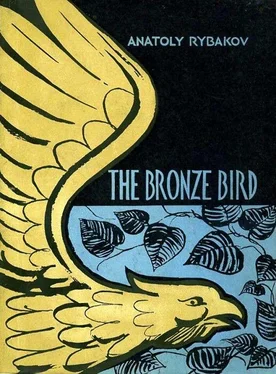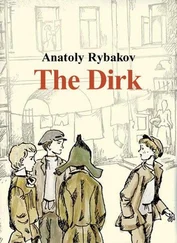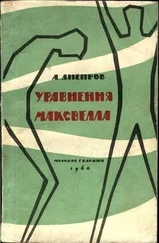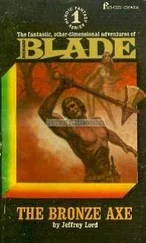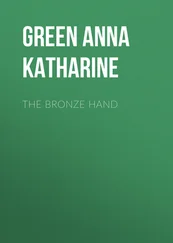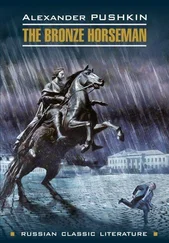Anatoly Rybakov - THE BRONZE BIRD
Здесь есть возможность читать онлайн «Anatoly Rybakov - THE BRONZE BIRD» весь текст электронной книги совершенно бесплатно (целиком полную версию без сокращений). В некоторых случаях можно слушать аудио, скачать через торрент в формате fb2 и присутствует краткое содержание. Город: Moscow, Год выпуска: 1956, Издательство: Foreign Languages Publishing House, Жанр: Детские приключения, Детектив, Исторические приключения, на английском языке. Описание произведения, (предисловие) а так же отзывы посетителей доступны на портале библиотеки ЛибКат.
- Название:THE BRONZE BIRD
- Автор:
- Издательство:Foreign Languages Publishing House
- Жанр:
- Год:1956
- Город:Moscow
- ISBN:нет данных
- Рейтинг книги:5 / 5. Голосов: 1
-
Избранное:Добавить в избранное
- Отзывы:
-
Ваша оценка:
- 100
- 1
- 2
- 3
- 4
- 5
THE BRONZE BIRD: краткое содержание, описание и аннотация
Предлагаем к чтению аннотацию, описание, краткое содержание или предисловие (зависит от того, что написал сам автор книги «THE BRONZE BIRD»). Если вы не нашли необходимую информацию о книге — напишите в комментариях, мы постараемся отыскать её.
THE BRONZE BIRD — читать онлайн бесплатно полную книгу (весь текст) целиком
Ниже представлен текст книги, разбитый по страницам. Система сохранения места последней прочитанной страницы, позволяет с удобством читать онлайн бесплатно книгу «THE BRONZE BIRD», без необходимости каждый раз заново искать на чём Вы остановились. Поставьте закладку, и сможете в любой момент перейти на страницу, на которой закончили чтение.
Интервал:
Закладка:
In silence they walked out of the hospital and stopped on the porch.
Genka looked about him nonchalantly as though nothing out of the ordinary had happened. Misha gazed at him reproachfully. "Do you realize what you did?" "What?" "You've still got the cheek to ask!"
"What have I done? I thought I swallowed a nail. What would you have done in my place? Kept your mouth shut? Said nothing about it and waited until it went right through you? I went to see a doctor. No harm in that, is there?"
"Can you tell me why you are always the one who:gets into hot water?" Misha shouted at him. "It never happens to anyone but you. Now one thing, now another. You gave everybody a fright, forced us to ask the chairman for a horse. And all for nothing! You've made a laughing-stock of us. I've had enough of your tomfoolery. You'll go to town and let them X-ray you."
Chapter 31
RURAL PAINTING
Genka went for the X-ray examination. But nothing was found in his stomach. He returned from town and reported to Misha.
That same evening Seva and Igor came back to the camp. They had been to Peschanaya Kosa and shown the investigator where they had found the boat. After that the investigator had allowed them to go home.
They felt they were heroes and strutted about, the camp as though they had done something extraordinary. They had not carried out their chief plan, which was to go to Italy and fight the fascists, but through their part in the Ribalin case they had put themselves in a special and exceptional position.
Although they were chock-full of pride and boasted, there was nothing important that they could tell Misha. At Peschanaya Kosa they had shown the investigator the place where they had found the boat. The investigator had measured it with a tape-measure. After that he went to the village and then to the railway station, but neither Igor, nor Seva knew why he went.
Misha was disappointed. He felt the investigator did not know his job. Why had he gone to Peschanaya Kosa instead of to the woods where those two men were hiding? Together with the boatman they had murdered Kuzmin. Misha did not doubt that for a minute.
As regards.Serov, they could,not say that he had treated Igor and Seva badly. The boys had slept on the hay in the shed. True, Serov's wife had not been very kind to them. She did not let them into the house, saying they would soil the floor. But Serov went to see them in the evenings and had questioned them closely.
"What did he ask you about?" Misha said, pricking up his ears.
"About everything the investigator wanted to know."
"Did you tell him?"
"Of course. He's a responsible official, you know."
The blockheads! He could not have expected anything else of them. They ran away from the camp, stirred up trouble and still had the nerve to strut about like peacocks!
"I'd come down a peg if I were you," Misha said. "You've made such a mess, that in your place people would have been as quiet as mice. Instead, you're proud of nobody knows what. Silly! Don't think you'll get off scot-free. I'll see that you don't wriggle out. At our next self-criticism meeting you'll know all about it. You'll know what all of us, think of you."
But Misha was in no hurry to set a date for the meeting. A self-criticism meeting never took less than two days. They could ill afford to spare so much time. The club had to be completed. They had finished furnishing it and now all that remained was to get it painted. The troop felt that the painting should be entrusted to the artist-anarchist Stepan Kondratyevich.
He came to the club and for a long time stood watching the troop-at work. Then he went to Misha and asked:
"Shall I start?"
"Yes. How are you planning to go about it?"
Stepan Kondratyevich traced a circle with his arm.
"It has to be painted. All round."
Misha remembered the artist's absurdly painted cottage. For a moment the fear that he would spoil the club crept into Misha's heart. But he could not show his distrust of a person who was volunteering his services. In general, Misha felt that the assistance of the local population should be enlisted. All the same, he asked:
"How will it look?"
"Magnificent," the artist said, throwing a dull gaze at the walls, of the shed, "in the latest style. We did the Bolshoi..."
"We can't pay you anything," Misha warned. "You'll have to do it free of charge."
"Yes." The artist sighed.
"And there's not enough paint."
Stepan Kondratyevich sighed again.
"I'll throw in some of mine. There's a little left. I gave what I had to the forester, but you can't get anything back from him now."
"What forester?"
"Kuzmin. The man who was murdered."
"You say he was a forester?"
"Yes. Before the Revolution. He worked for the count. A trusted employee."
So that's what it was! Kuzmin had worked for the count. As a forester, he knew the woods well... Again the woods. The very woods where those men disappeared with the sacks brought by the boatman. There was some mystery about those woods. And then that legend about the Goligin Brushwood Road and about the beheaded phantoms-had it not all been invented to keep people away? There was something in that. It was now clear to Misha that, he had to go and see the Goligin road for himself to find out if those men were still there and if so what they were doing.
Misha's thoughts were interrupted by Stepan Kondratyevich, who declared that he would paint the club that night. Nobody would disturb him, there would be no dust and on the whole it was his habit to work at night., But he would need the help of two boys. Misha appointed the Bleater and Seva to help him. The next day, when the troop approached the club they saw a large crowd in front of it.
What had happened? The youngsters quickened their pace. But by the smiles on the faces of the peasants, by the laughter and jokes, Misha realized that something funny rather than tragic had happened. And when he stepped inside the club he was so taken aback by what he saw that he did not know whether to cry or to laugh.
The club was painted in the wildest way imaginable: curved lines, circles, stripes, triangles, and simply splashes of colour, some shapeless, others reminiscent of the faces of wild animals. The benches were striped like zebras. The curtain looked like the apron of a house-painter. One of the beams was black, another was red and the third- yellow. A slogan was painted on each of the beams: "Anarchy is the mother of order." "Long live pure art!" "Down with the ten capitalist-ministers!" Misha was horrified.
Stepan Kondratyevich was pacing up and down the club with a proud and independent bearing. The Bleater and Seva looked as proud and independent. They were quite serious when they told Misha that this was the latest style in art. That, they declared, was how people the world over painted. That was how Mayakovsky had painted when he was an artist. He had stopped painting like this because he had become a poet. The Bleater even made an attempt to explain the meaning of some blot, but got entangled in what he was saying and ended up without explaining anything.
In one of the groups of villagers standing in front of the club were Yerofeyev and the chairman of the Village Soviet, a young man who had recently been demobilized from the Red Army. Everybody called him Vanya, but Yerofeyev called him by his name and patronymic-Ivan Vasilyevich. He was a good man, who came from a middle-peasant family, but he did not feel sure of himself in his job and was for that reason, so it seemed to Misha, timid before the kulaks and let them do what they liked. Misha had been at one of the meetings when the chairman had spoken passionately and firmly about the common meadow where the livestock grazed. Yerofeyev had supported him at the time, but later turned everything round to suit himself and embarrassed the chairman so much that in the end Vanya gave in to him.
Читать дальшеИнтервал:
Закладка:
Похожие книги на «THE BRONZE BIRD»
Представляем Вашему вниманию похожие книги на «THE BRONZE BIRD» списком для выбора. Мы отобрали схожую по названию и смыслу литературу в надежде предоставить читателям больше вариантов отыскать новые, интересные, ещё непрочитанные произведения.
Обсуждение, отзывы о книге «THE BRONZE BIRD» и просто собственные мнения читателей. Оставьте ваши комментарии, напишите, что Вы думаете о произведении, его смысле или главных героях. Укажите что конкретно понравилось, а что нет, и почему Вы так считаете.
